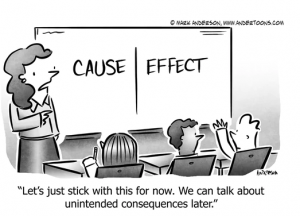 Nearly all of us have heard the term “unintended consequences”, but we often do not have the temperament or sufficient experience to avoid them.
Nearly all of us have heard the term “unintended consequences”, but we often do not have the temperament or sufficient experience to avoid them.
We certainly saw examples of that this month where the unintended consequences led to not only an attack on the United States capitol, but also leading to federal criminal charges, significant losses of political contribution and loss of business for certain organizations.
In 2018, in the publication The Library of Economics and Liberty, Robert Norton wrote, “The law of unintended consequences, often cited, but rarely defined, is that actions of people, and especially of government, always have effects that are unanticipated or unintended.”
IN THE PAST FEW WEEKS …
We have seen in recent weeks, just a few of the unintended consequences of the activity related to the attack on the US capitol:
•  The second impeachment of the President
The second impeachment of the President
• The loss by the Trump Corporation of contracts with New York City of contracts generating $17 million per year.
• The loss of most, if not all, banking relations of the Trump Corporation
• Hundreds of Federal charges and potential charges related to the mob at the Capital
• Job losses for participants ranging from blue collar jobs to attorneys and college professors. Politicians have lost book contracts and large campaign donations.
• Loss of access to social media platforms.
• A move to disbar the former Mayor of New York and another prominent attorney, accompany by significant lawsuits.
THIS DOESN’T INVOLVE ME …
 But, you say, what does that have to do with me? Particularly if you manage a mid-size business, not at all connected with these larger political issues. However, in the article quoted above, the same type of thinking that led to these unintended consequences in government, also affects business in numerous ways.
But, you say, what does that have to do with me? Particularly if you manage a mid-size business, not at all connected with these larger political issues. However, in the article quoted above, the same type of thinking that led to these unintended consequences in government, also affects business in numerous ways.
When the unintended consequence of a decision is favorable, there is never an issue. The favorable outcome is usually considered a bonus. But when the unintended consequence is adverse, depending on the impact, the decision process is questioned as is the individual who made the decision.
 In the article, Norton focused on the causes of unintended consequences, three of these which are in the control of the decision maker. These are ignorance, error, and immediacy of interest.
In the article, Norton focused on the causes of unintended consequences, three of these which are in the control of the decision maker. These are ignorance, error, and immediacy of interest.
In both ignorance and error, leaders make decisions on issues without considering the unintended consequences, or before needed information is obtained. These are decisions that are not well thought out nor operationalized.
HOW WILL COMPETITORS RESPOND?
Consider a company in which the management of a business unit presented their plan to enter a new market without any consideration of the unintended consequence of a competitive response and how it would impact the company’s market entry.
 A question to ask: Is the market growing at a sufficient rate to absorb a new supplier without a competitive response? Will competitors respond by price cutting, or in a different way?
A question to ask: Is the market growing at a sufficient rate to absorb a new supplier without a competitive response? Will competitors respond by price cutting, or in a different way?
What differentiates this new product in the marketplace to limit a competitive response? Why would customers switch buying from their incumbent supplier and decide to buy from the company?
 How competitors might respond to a new market entry is unknown. A leader will often need to make a decision, but the information desired to make a fully informed decision is not available.
How competitors might respond to a new market entry is unknown. A leader will often need to make a decision, but the information desired to make a fully informed decision is not available.
Before making that decision, effective leaders listen to the opinions of their experts and they fall back on their own experience, common sense, and good critical judgment.
This is how they de-risk a decision and minimize the chance of unintended consequences.
THE CHALLENGER DISASTER …
 Immediacy of interest describes the type of decision where “someone wants the intended consequence of an action so much that he purposefully chooses to ignore any unintended effects,” to the peril of the decision maker and the organization.
Immediacy of interest describes the type of decision where “someone wants the intended consequence of an action so much that he purposefully chooses to ignore any unintended effects,” to the peril of the decision maker and the organization.
NASA’s decision to launch the space shuttle Challenger on Jan. 28, 1986 against the advice of the Thiokol engineers is an example of a decision driven by immediacy of interest. NASA had promised Congress a too aggressive and unrealistic launch frequency.
The pressure to meet this schedule resulted in a catastrophic decision to launch the Challenger in adverse temperature conditions, well below the ambient temperature for which the solid rocket booster O-rings were designed.
 Upon hearing Thiokol’s recommendation to delay the launch due to risks to the astronauts and the shuttle, one of the NASA officials stated, “I am appalled by your recommendation.”
Upon hearing Thiokol’s recommendation to delay the launch due to risks to the astronauts and the shuttle, one of the NASA officials stated, “I am appalled by your recommendation.”
Another NASA official stated, “My God, Thiokol, when do you want me to launch – next April?” NASA launched Challenger, and shortly after the launch the O-rings failed, resulting in an explosion and the catastrophic deaths of seven astronauts and loss of the shuttle.
WHAT CAUSES SUCH DECISIONS?
What is the cause of immediacy of interest type decisions? Certainly, hubris is one cause. Dictionary.com defines hubris as “excessive pride or self-confidence, arrogance. Arrogant leaders are rarely if ever successful over the long term.
Another cause of immediacy of interest decisions is the pressure to act, which in and of itself is a way of achieving results. However, at what risk and at what cost?
How many times do we read in the press about unethical or illegal acts that were committed due to the pressure to get something done? These situations eventually almost always become public, adversely impacting the reputations of the individuals and organizations involved.
The reputations of organizations may recover over time. Those of the individuals never do.
HOW TO AVOID SUCH DISASTERS …
 How can you avoid immediacy of interest decisions.
How can you avoid immediacy of interest decisions.
Surround yourself with people who will tell you what they think, not what you believe you want to hear.
Have experts that both have the expertise to advise, but do not have the same vested interest in the decision.
They know more about the unintended consequences than you do.
And remember, what you do reflects not only on you, but on your organization and your colleagues as well.
Revitalization Partners specializes in improving the operational and financial results of companies and providing hands-on expertise in virtually every circumstance, with a focus on small and mid-market organizations. Whether your requirement is Interim Management, a Business Assessment, Revitalization and Reengineering or Receivership/Bankruptcy Support, we focus on giving you the best resolution in the fastest time with the highest possible return.




